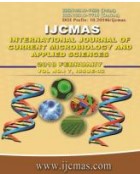


 National Academy of Agricultural Sciences (NAAS)
National Academy of Agricultural Sciences (NAAS)

|
PRINT ISSN : 2319-7692
Online ISSN : 2319-7706 Issues : 12 per year Publisher : Excellent Publishers Email : editorijcmas@gmail.com / submit@ijcmas.com Editor-in-chief: Dr.M.Prakash Index Copernicus ICV 2018: 95.39 NAAS RATING 2020: 5.38 |
The comprehensive focus on plant based extract in textile coating as antimicrobial textile finish has gained significant momentum and is an emerging technology in the production of medical cloths. The present study was undertaken to assess the antibacterial activity of cotton fabric treated with E. globulus, T. cordifolia and T. procumbens leaf extracts. Extraction of phytochemicals was carried out by different solvents viz., ethanol, methanol and distilled water. Total phenolic content results revealed that TPC of E. globulus and T. procumbens was high in ethanol (302.67 and 42.20mg/g) extract whereas in case of T. cordifolia, high TPC was found to be in distilled water extract (465.82mg/g). Bioassay results revealed that crude ethanol extract of all the plant sources exhibited good antibacterial activity against S. aureus and E. coli compared to 5 and 10% extract concentrations. Further, irrespective of the sources, the fabrics treated with 10% ethanol extract exhibited positive antibacterial activity against both the test organisms. This study thus explored the antimicrobial functionality of cotton fabrics coated with plant extract as value added textile product. Hence it can be concluded that the leaf extracts of E. globulus, T. cordifolia and T. procumbens can be efficiently used as an antimicrobial agent for the preparation of antimicrobial textile finish particularly for medical cloths.
 |
 |
 |
 |
 |